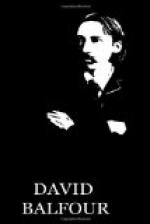“You have given the very words,” said I. “Here at the cross, and at the pier and shore of Leith, for sixty days.”
“Ye’re a sounder Scots lawyer than Prestongrange, then!” cries the Writer. “He has had Alan summoned once; that was on the twenty-fifth, the day that we first met. Once, and done with it. And where? Where, but at the cross of Inverary, the head burgh of the Campbells. A word in your ear, Mr. Balfour—they’re not seeking Alan.”
“What do you mean?” I cried. “Not seeking him?”
“By the best that I can make of it,” said he. “Not wanting to find him, in my poor thought. They think perhaps he might set up a fair defence, upon the back of which James, the man they’re really after, might climb out. This is not a case, ye see, it’s a conspiracy.”
“Yet I can tell you Prestongrange asked after Alan keenly,” said I; “though, when I come to think of it, he was something of the easiest put by.”
“See that!” says he. “But there! I may be right or wrong, that’s guesswork at the best, and let me get to my facts again. It comes to my ears that James and the witnesses—the witnesses, Mr. Balfour!—lay in close dungeons, and shackled forbye, in the military prison at Fort William; none allowed in to them, nor they to write. The witnesses, Mr. Balfour; heard ye ever the match of that? I assure ye, no old, crooked Stewart of the gang ever outfaced the law more impudently. It’s clean in the two eyes of the Act of Parliament of 1700, anent wrongous imprisonment. No sooner did I get the news than I petitioned the Lord Justice Clerk. I have his word to-day. There’s law for ye! here’s justice!”
He put a paper in my hand, that same mealy-mouthed, false-faced paper that was printed since in the pamphlet “by a bystander,” for behoof (as the title says) of James’s “poor widow and five children.”




